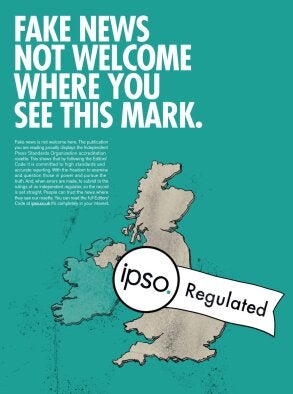
The UK’s largest press regulator has launched an advertising campaign in national newspapers to tell readers that “fake news is not welcome” in publications it regulates.
The Independent Press Standards Organisation is using the campaign to highlight the “IPSO mark”, a symbol carried by the newspapers and magazines signed up to the press watchdog.
The IPSO mark, which launched in December last year, shows readers these publications are held to standards required by the Editors’ Code of Practice and have made themselves accountable to the industry-funded regulator’s rulings.
IPSO said its new advert was designed to make the point that fake news is not welcome wherever readers see the mark, and emphasises that IPSO-regulated publications are “committed to high standards and accurate reporting”.
It will enable readers to understand how to complain about stories they see in IPSO-regulated publications.
Launched today, the advert will appear in The Sun and Sun on Sunday; The Mirror and Sunday Mirror; The Daily Mail and Mail on Sunday; The Telegraph and Sunday Telegraph; The Star on Sunday and The Daily Star; The Sunday Express and The Daily Express; The Sunday Times and The Times; and Express and Star titles.
The Financial Times, The Guardian and The Observer, the Evening Standard and the Independent are all self-regulated.
Matt Tee, IPSO chief executive, said: “IPSO has developed some great services for the public and it’s important that people are more aware of them.
“A key part of IPSO’s work is to empower the public, whether that is enabling them to differentiate between professional content and internet dross or giving them a leg up, so that people who have been wronged can get restitution, without paying huge legal fees.”

IPSO advert
Speaking on the Today programme, Tee explained IPSO’s use of the term “fake news” was intended to mean something which is “inaccurate, distorted or misrepresented”.
He added: “We absolutely don’t mean things that I don’t like because I don’t agree with the opinion expressed.
“The claim is that any piece of news that has our kitemark next to it has been produced against a set of professional standards and if you believe that it doesn’t meet those professional standards, if it is misleading or distorted, then you can complain to us and we can force a newspaper to carry a correction or adjudication saying that they got it wrong.
“That isn’t true for an awful lot of what you might find on the internet.”
Picture: Reuters/Luke MacGregor
Email pged@pressgazette.co.uk to point out mistakes, provide story tips or send in a letter for publication on our "Letters Page" blog
